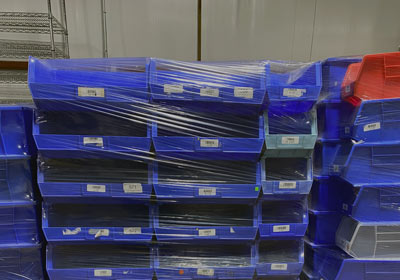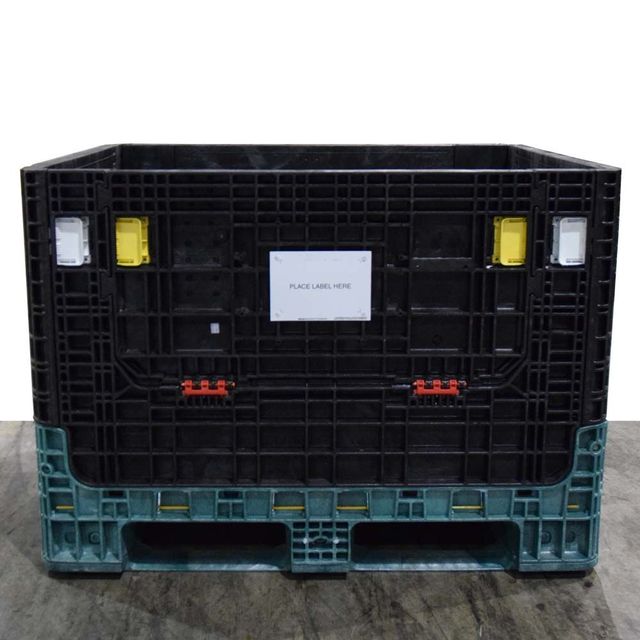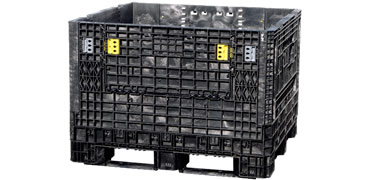Ingenious Solutions: Uncovering the Flexibility of Bulk Containers in Various Industries
Mass containers have actually become a crucial innovation throughout numerous sectors. Their layout boosts storage and transport efficiency, dealing with diverse demands while advertising sustainability. Organizations in agriculture, production, and logistics report considerable enhancements in functional processes. However, real extent of their influence may not yet be completely understood. Checking out the various applications and benefits of bulk containers might reveal insights that improve sector criteria. What exists in advance for this developing remedy?
Enhancing Agricultural Effectiveness With Bulk Containers
How can mass containers change agricultural methods? In the domain of farming, mass containers act as a crucial technology, improving efficiency and sustainability. They allow farmers to save and transport big amounts of fertilizers, grains, and seeds, decreasing the demand for multiple smaller plans that typically add to waste. By making use of mass containers, farming operations can optimize their supply chains, minimizing taking care of costs and time. These containers are designed for very easy loading and dumping, allowing for swift shifts in between various phases of farming procedures.
Bulk containers advertise better inventory management, making sure that manufacturers have adequate materials on hand without extra. This effectiveness translates to reduced labor expenses and enhanced productivity. In a market often tested by changing demand and seasonal variations, the integrity and scalability used by mass containers present a considerable benefit, empowering farmers to concentrate on quality and return.
Enhancing Manufacturing Processes With Mass Solutions
Bulk solutions play an essential role in enhancing production processes by facilitating reliable product handling and supplying affordable storage space options. These containers aid keep a well organized production environment, ultimately boosting workflow and performance. As markets significantly embrace bulk options, they are likely to experience significant enhancements in operational effectiveness.
Effective Product Handling

Effective material handling is crucial for enhancing production procedures, as it directly impacts performance and cost-effectiveness. Using bulk containers can substantially enhance operations by streamlining the movement and storage space of materials. Their layout enables very easy loading and unloading, reducing the moment workers invest managing specific items. This effectiveness not just decreases labor costs yet additionally enhances operations, making it possible for producers to respond quickly to demand variations. In addition, bulk containers promote far better organization within centers, facilitating quick accessibility to products and reducing downtime. By applying these versatile remedies, suppliers can boost total operational effectiveness, ensuring that assembly line run efficiently and properly while decreasing waste and source expense. Consequently, bulk containers play an essential role in improving product handling practices.
Cost-efficient Storage Solutions
As manufacturers seek to optimize their procedures, affordable storage solutions come to be progressively important. Bulk containers provide a useful methods of keeping big amounts of materials, reducing the need for multiple smaller storage systems. This debt consolidation causes lower inventory prices, as bulk containers commonly call for less handling and cause decreased labor costs. Additionally, their standardized dimensions promote efficient stacking and storage, making best use of stockroom area. By utilizing bulk containers, suppliers can minimize waste and improve the general organization of their centers. These containers are likewise made for toughness, which can reduce substitute costs in time. In general, incorporating mass containers into storage approaches permits manufacturers to improve procedures while keeping earnings and performance in their supply chains.

Improved Production Workflow
Making use of bulk containers substantially enhances production operations by simplifying the management of products throughout the production procedure. These containers help with efficient storage space and transportation, decreasing the moment spent on dealing with materials. Because of this, manufacturers can attain quicker turnaround times and minimize hold-ups in manufacturing. Bulk containers also promote far better organization, permitting teams to easily access basic materials when required, which better enhances operations. In addition, the standardized shapes and size of these containers enable optimized usage of storehouse area, adding to general efficiency. By incorporating mass solutions into their procedures, firms can improve supply control and decrease waste, eventually resulting in increased performance and a much more agile production setting.
Revolutionizing Food Service Logistics
The food service market is undergoing substantial makeover with the fostering of mass containers, boosting storage space abilities and optimizing area use. Effective storage services make it possible for services to manage inventory extra efficiently, while structured transportation processes enhance and lower prices delivery times. Therefore, these developments are reshaping logistics and driving better efficiency across the sector.
Reliable Storage Solutions
Innovative storage options are changing food service logistics by improving effectiveness and optimizing room use. Mass containers, designed for maximum capability, permit food service carriers to lessen lost area while keeping simple access to products. These containers can be stacked and organized according to inventory requirements, enhancing the storage procedure. Furthermore, their longevity assurances that food remain safe and safe, lowering perishing and losses. With features such as modular designs and compatibility with various shelving systems, these containers can adapt to varied kitchen formats. By employing effective storage options, food service procedures not just boost process yet also enhance general efficiency, ensuring that resources are used efficiently to fulfill customer demands.
Streamlined Transport Procedures
While several aspects add to the efficiency of food solution logistics, structured transportation procedures play an essential function in maximizing supply chain procedures. The adoption of bulk containers greatly boosts the motion of goods, enabling for quicker loading and discharging at distribution. Their standard dimensions help with reliable stacking and storage, minimizing thrown away area throughout transit. Furthermore, mass containers minimize the requirement for extreme product packaging, leading to reduce costs and decreased ecological impact. By ensuring that items are safely moved, they minimize damages and spoilage, which is vital in the disposable food market. Generally, the assimilation of bulk containers right into transportation strategies not just increases operational performance yet additionally supports lasting methods within the food solution industry.
The Function of Bulk Containers in Pharmaceutical Supply Chains
In the pharmaceutical industry, bulk containers play a vital function in making sure the safe and effective transportation of basic materials and completed products. These containers are particularly made to fulfill rigorous governing requirements, giving perfect protection versus contamination and destruction throughout transit. Their durable building and construction permits the safe transportation of delicate materials, such as active pharmaceutical components (APIs) and complicated formulas, while decreasing the threat of damage.
In addition, bulk containers promote structured handling and storage operations within stockrooms and production facilities. Their standardized dimensions additional reading allow compatibility with automated systems, improving performance and lowering labor prices. By utilizing mass containers, pharmaceutical firms can attain significant cost savings with mass investing in and reduced packaging waste.
Advertising Sustainability in Product Packaging Practices
The pharmaceutical industry's raising reliance on bulk containers has actually prompted a broader evaluation of sustainability in product packaging practices throughout various industries. As firms look for to reduce their ecological influence, cutting-edge strategies to packaging have actually gained grip. Bulk containers, developed for reuse and recycling, provide a practical option. Their longevity expands product lifecycles, decreasing the requirement for single-use packaging.
The shift towards biodegradable products and environmentally friendly layers has ended up being integral in the style of these containers. This modification not only addresses waste decrease but also lines up with consumer need for sustainable products.
Industries such as food and cosmetics are adopting similar techniques, identifying that lasting product packaging can improve brand name track record. Joint campaigns in between suppliers and providers better advertise sustainability, urging the development of closed-loop systems - used collapsible bulk containers. Ultimately, welcoming sustainable product packaging methods is important for fostering a round economic climate and mitigating the environmental impact across diverse markets
Cost-efficient Transportation Solutions With Bulk Containers

Mass containers streamline taking care of procedures, leading to lowered labor expenses and lessening the danger of damage during transportation - refurbished bulk containers. Industries such as farming, chemicals, and pharmaceuticals benefit from the sturdiness and effectiveness of these containers, which can stand up to severe conditions while guaranteeing the integrity of their components
Additionally, the reusable nature of bulk containers adds to long-lasting financial savings, as companies can depend on less, more resilient units instead of often changing single-use product packaging. By doing this, mass containers not just boost performance yet also sustain overall expense monitoring in supply chain procedures.
Personalization and Flexibility in Bulk Container Design
While several bulk containers are created for conventional applications, their modification and flexibility have actually ended up being essential functions for industries with one-of-a-kind requirements. Producers currently provide an array of alternatives, permitting customers to tailor containers to details dimensions, products, and capabilities. This versatility makes it possible for companies to enhance storage and transport processes, making certain compatibility with various handling systems.
For instance, the food and pharmaceutical markets commonly call for containers that fulfill strict hygiene and safety and security criteria. Customized styles may incorporate functions such as tamper-proof Get More Info seals, easy-to-clean surfaces, and specialized air flow systems. In the farming sector, mass containers can be customized to help with the transport of varied commodities, used bulk containers from grains to fluids, improving operational effectiveness.
Inevitably, the ability to customize mass containers not only enhances performance but additionally sustains sustainability efforts by minimizing waste and making best use of source use throughout numerous fields. This adaptability settings bulk containers as functional solutions in today's vibrant market.
Regularly Asked Concerns
What Products Are Bulk Containers Generally Made From?
Mass containers are normally made from products such as high-density polyethylene (HDPE), polypropylene, steel, or light weight aluminum. These products use longevity, resistance to chemicals, and the capacity to safely store and transfer different items across industries.
Exactly How Are Bulk Containers Cleaned Between Uses?
Bulk containers are usually cleaned up using high-pressure washing, heavy steam cleaning, or chemical sanitization techniques (used plastic containers). The cleansing process guarantees that deposits are gotten rid of, avoiding contamination and keeping the high quality of components for subsequent uses

Can Mass Containers Be Recycled Multiple Times?
Yes, bulk containers can be recycled several times. Their robust layout permits duplicated usage throughout different applications, supplied they are effectively cleaned and maintained after each usage to guarantee safety and security and hygiene standards.
What Are the Weight Purviews for Bulk Containers?
Weight limitations for mass containers typically vary from 1,000 to 3,000 pounds, relying on the material and style. Specs might vary by maker, so it is important to consult standards for specific container types.
Are There Typical Dimensions for Bulk Containers?
Yes, there are common sizes for mass containers, normally ranging from 20 to 40 cubic feet. These dimensions help with effective storage and transport across various industries, making certain compatibility with equipment and optimizing space usage.
Utilizing bulk containers can considerably streamline operations by simplifying the motion and storage of products. In enhancement, bulk containers advertise better organization within facilities, assisting in quick accessibility to products and reducing downtime. Bulk containers supply a practical methods of storing big amounts of materials, decreasing the need for multiple smaller storage units. The food solution market is undertaking considerable improvement via the adoption of mass containers, boosting storage space capabilities and maximizing room utilization. Bulk containers promote structured handling and storage space operations within stockrooms and production centers.